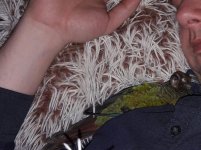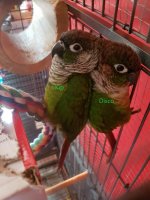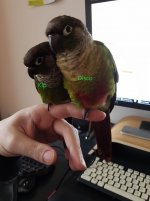Hello everyone!
English isn't my first language, my appologies for any grammer or spelling mistakes. I really need some help with figuring out what's bothering one of my two conures.
For about a year now he (or she, we never bothered to had their sexes examined) has been developing a growing fear of hands. But he's only afraid of hands when it comes to petting, holding and headscratches. Most of the time he'll take a running jump to hop on my finger without hesitation, sometimes he'll shy away and become reluctant. When I've got food or treats he becomes his old self again, he'll start bobbing, waving, giving kisses and jump on my hand without hesitation.
It used to be that he only displayed this behavior towards me, but as of late he's also showing the same behavior towards my girlfriend.
I have a pretty good idea where this started, christmas last year we were having a gourmet night at home (I don't know if that translates well to english, it involves a big heated plate where you can bake small pieces of meat and veggies) I had placed the birdcage in the hallway outside the livingroom because the pan has this non-stick teflon coating and I'd like my birds to stay alive.
Somehow, Dicso, the main character in this help-request, managed to open the cage and escape. He must have been patiently waiting on top of the cage because as soon as someone opened the livingroom door to go to the bathroom, Disco came flying in. He was really hyped up and would fly away everytime me, my girlfriend or someone else came near him. After about 20 minutes of people chasing him around the livingroom (he's one fast and agile bird) he was completely out of breath and I could pick him up and put him back in the cage with his friend.
At first this didn't seem to affect him, but over the following months he started showing the problem behavior.
Since early this year I've been unable to work due to cancer, and a burn-out caused by being diagnosed with cancer so I've got a lot of time to spend with my birds. But for the life of me I'm not making any progress with Disco. Somedays he's a bit more willing than others but in general there's very little improvement.
Some behavior examples:
-He's not a biter, never has been. If I do something unwanted, he'll gently pinch a finger but it's never a full on, mark-leaving bite. Except when trimming nails, he HATES that.
-He'll wave and give a high-5 with my pinky without hesitation
-I can pet his head with the tip of my pink sometimes, but usually he'll shy away or bend all the way down in somesort of fear/submission behavior.
-open palm hands scare him away. Except if you've got treats.
-He used to dive into open palm hands as a place where he could cuddle and fall asleep.
-He used to spend a lot of time with us, sleeping on his back. Usually when watching TV, he'd scurry over, lean into my hand and fall asleep. Other times he'd roll himself onto his back on my chest and sleep for a while.
-General behavior is a lot more distant at times. He won't sit with us for more than a minute or two before moving on. As of late he's found himself a little hiding place between a some pans on a shelf in the kitchen where he likes to hang out.
Our birds have a lot of freedom around the house. Outside of summer season we don't clip their wings. They are out of the cage most of the day and are free to follow us wherever we go. Though as long as we're in the livingroom, they'll perch nearby.
A part of me thinks Disco's behavior may be related to the other conure (who's name is Kip) aswel. Kip does this weird slow-motion fancy walk sometimes, combined with doing a weird slow-motion dipping. Sometimes Kip will raise up her tail feathers and chase Disco around walking backwards. This makes us believe Kip is female, but Disco isn't interested in this behavior.
Some other maybe relevant info
Kip will be 2 years old on December 10th. She had to leave the nest early because the parent birds kept attacking her. Hand-raised her from about 2 weeks old. A loving and affectionate bird that missed alot of socializing. That's when we got Disco to keep her company
Disco will be around 3,5 years old. The breeder claimed that he was around 2 years old aswell but his development was much further. He came from a nest of about 8 birds. Very easy to get along with, very tame.
Kip looks a lot frailer than Disco. When Kip takes a bath, she's soaked all the way through. When Disco takes a bath, his outer feathers are wet but the fluffy ones stay dry. Kip has a slightly longer, thinner pointy beak, Disco has a bit wider, stubby beak. Disco is curious and will approach new things with minimal hesitation, Kip will wait to see what Disco does.
What can I do?
English isn't my first language, my appologies for any grammer or spelling mistakes. I really need some help with figuring out what's bothering one of my two conures.
For about a year now he (or she, we never bothered to had their sexes examined) has been developing a growing fear of hands. But he's only afraid of hands when it comes to petting, holding and headscratches. Most of the time he'll take a running jump to hop on my finger without hesitation, sometimes he'll shy away and become reluctant. When I've got food or treats he becomes his old self again, he'll start bobbing, waving, giving kisses and jump on my hand without hesitation.
It used to be that he only displayed this behavior towards me, but as of late he's also showing the same behavior towards my girlfriend.
I have a pretty good idea where this started, christmas last year we were having a gourmet night at home (I don't know if that translates well to english, it involves a big heated plate where you can bake small pieces of meat and veggies) I had placed the birdcage in the hallway outside the livingroom because the pan has this non-stick teflon coating and I'd like my birds to stay alive.
Somehow, Dicso, the main character in this help-request, managed to open the cage and escape. He must have been patiently waiting on top of the cage because as soon as someone opened the livingroom door to go to the bathroom, Disco came flying in. He was really hyped up and would fly away everytime me, my girlfriend or someone else came near him. After about 20 minutes of people chasing him around the livingroom (he's one fast and agile bird) he was completely out of breath and I could pick him up and put him back in the cage with his friend.
At first this didn't seem to affect him, but over the following months he started showing the problem behavior.
Since early this year I've been unable to work due to cancer, and a burn-out caused by being diagnosed with cancer so I've got a lot of time to spend with my birds. But for the life of me I'm not making any progress with Disco. Somedays he's a bit more willing than others but in general there's very little improvement.
Some behavior examples:
-He's not a biter, never has been. If I do something unwanted, he'll gently pinch a finger but it's never a full on, mark-leaving bite. Except when trimming nails, he HATES that.
-He'll wave and give a high-5 with my pinky without hesitation
-I can pet his head with the tip of my pink sometimes, but usually he'll shy away or bend all the way down in somesort of fear/submission behavior.
-open palm hands scare him away. Except if you've got treats.
-He used to dive into open palm hands as a place where he could cuddle and fall asleep.
-He used to spend a lot of time with us, sleeping on his back. Usually when watching TV, he'd scurry over, lean into my hand and fall asleep. Other times he'd roll himself onto his back on my chest and sleep for a while.
-General behavior is a lot more distant at times. He won't sit with us for more than a minute or two before moving on. As of late he's found himself a little hiding place between a some pans on a shelf in the kitchen where he likes to hang out.
Our birds have a lot of freedom around the house. Outside of summer season we don't clip their wings. They are out of the cage most of the day and are free to follow us wherever we go. Though as long as we're in the livingroom, they'll perch nearby.
A part of me thinks Disco's behavior may be related to the other conure (who's name is Kip) aswel. Kip does this weird slow-motion fancy walk sometimes, combined with doing a weird slow-motion dipping. Sometimes Kip will raise up her tail feathers and chase Disco around walking backwards. This makes us believe Kip is female, but Disco isn't interested in this behavior.
Some other maybe relevant info
Kip will be 2 years old on December 10th. She had to leave the nest early because the parent birds kept attacking her. Hand-raised her from about 2 weeks old. A loving and affectionate bird that missed alot of socializing. That's when we got Disco to keep her company
Disco will be around 3,5 years old. The breeder claimed that he was around 2 years old aswell but his development was much further. He came from a nest of about 8 birds. Very easy to get along with, very tame.
Kip looks a lot frailer than Disco. When Kip takes a bath, she's soaked all the way through. When Disco takes a bath, his outer feathers are wet but the fluffy ones stay dry. Kip has a slightly longer, thinner pointy beak, Disco has a bit wider, stubby beak. Disco is curious and will approach new things with minimal hesitation, Kip will wait to see what Disco does.
What can I do?



